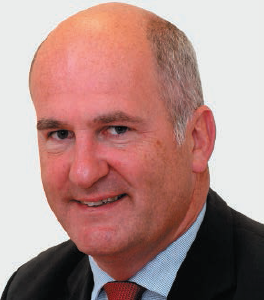Following Brexit, like many other people with Irish parents, I started the process of applying for an Irish passport. The Irish embassy website informed me, to my surprise, that I had become an Irish citizen on the day I was born. Despite that status, and despite owning a home in County Kerry, I have to admit I know very little about the Irish healthcare system. In fact, having worked my entire life in English healthcare, I do not fully understand the systems in the other three constituent countries of the UK either. My career has mostly involved both primary and secondary care, so I do understand the issues and difficulties of communication between hospitals and general practitioners (GPs).

It was, therefore, with great interest that I read the paper by Coughlan et al. (see pages 138–40). The authors raise very important points regarding both the importance of adequate discharge information and the poor delivery of appropriate up-titration of medicines when the patient has arrived home post-ST-elevation myocardial infarction (STEMI). They cite the failure of junior doctors to give adequate instructions to GPs on how to up-titrate medications and how educating the juniors improved performance. But they raise more questions than they answer. Why not have a pre-printed pro forma to attach to discharge summaries with this information on it? Why educate the juniors who rotate every four months and not the GPs, who do not? Why not cut out the middleman?
Discharge summaries
Discharge summaries should be produced at the point of discharge and given to the patient. The information on them should be in a form that the GP understands and, ideally, the patient can also understand. Discussions with GP colleagues could facilitate better discharge information. One of our local tertiary care centres admits to writing the discharge summary to comply with the Myocardial Infarction National Audit Project (MINAP). As a result of this, the GP receives lots of highly technical information, which is meaningless. An ideal discharge summary is on one, maximum two, sheets of paper and only contains relevant material.
I would take issue with the instruction to perform a fasting lipid profile. There is little to gain in requiring the patient to fast when they are on a statin. I would also take issue with the definitions of subtherapeutic doses of statins including rosuvastatin <10 mg per day. I would want to have at least 20 mg of this statin after my STEMI.
Questions not asked
Then there are the questions not raised in the paper, which are of equal importance, i.e. down-titration and stopping medications. The authors point out that National Institute for Health and Care Excellence (NICE) guidelines state that there should be clear information for the GP regarding plans for antiplatelet and anticoagulant treatment. Quite right, we say. But who really knows the answers to these questions? When should antiplatelets be stopped? What should we do about the vexed question of mixing an antiplatelet with an anticoagulant? Indeed should we be stopping beta blockers at some point? There are plenty of outstanding research questions.
I must thank the authors for highlighting this issue and hopefully sparking some debate. The journal would welcome more contributions regarding best practice in discharge communication.
P.S. I have some news relevant to my previous comments about Brexit. I have just stepped down as Secretary of the British Hypertension Society. One of my duties this year was to organise a poll of members regarding a change of name for the society. We ran the poll at the same time as the Brexit referendum. As a result of our poll, and subsequent ratification at our annual business meeting held in Dublin on 20 September 2016, we are now known as the British and Irish Hypertension Society (BIHS).
Conflict of interest
TM has previously received honoraria from AstraZeneca, Bayer, BMS/Pfizer, Boehringer-Ingelheim and Daiichi-Sankyo who market statins, anti-platelets and/or anticoagulant medications.
Editors’ note
See also the article by Coughlan et al. on pages XXX of this issue.
